An Analysis of Factors Determining Water Supply in Kenya.A Case Study of Nanyuki Water and Sewerage Company
Abstract
Water supply is one of the most important thing in human life and all the living creatures. It is for this reason that this research sought to analyze factors determining water supply encountered by communities living in and around Nanyuki as a result of water disconnections by water providers. This study sought to analysis factors determining water supply in Laikipia County, Kenya with focus of NA WASCO. The study was guided by the following specific objectives; lifestyle, location of water offices, consumer income and consumer decisions roles as regard to water service provider in Kenya. The study adopted a descriptive research design and target population will comprise consumers whose accounts are active and include a total of 13764 domestic consumers, 804 commercial and 17 industrial consumers total of 14585 based in Nanyuki Town. Multi-stage sampling technique was used where the researcher first divided the target population into clusters and then a simple random sampling technique wasused. From this population, a sample size was drawn of 187 domestic consumers, 13 commercial and 2 industrial consumers totaling to 201 respondents who get water from NAWASCO in Nanyuki town. Quantitative data was analyzed using frequencies and percentages as while as qualitative data which was analyzed using content analysis. The findings were presented using frequency tables, graphs and pie charts. The finding of the study will be significant both to water consumers and water providers in many aspects, where the consumer will benefit from regular and reliable water supply services and water management institutions will also benefit from increased revenue collections from the consumers. The study concludes that consumer lifestyle, consumer location, consumer income and consumer decision have a huge implication on water supply. Multiple linear regression was run to predict the dependent variable; water supply from the independent variables consumer lifestyle, consumer location, and consumer income and consumer decision. The findings indicated that consumer lifestyle, consumer location, consumer income and consumer decision were significantly different from zero. Thus the four variables statistically significantly added to the prediction of water supply in water and sewerage companies. The study recommends that there is need to set up the right institutional framework, development of a consumer based orientation for example through better data coverage more details on consumer behavior and its effects on water supply and there is need for water and sewerage companies to educate the people on reducing the wasteful results of water consumption.
Publisher
KeMU

